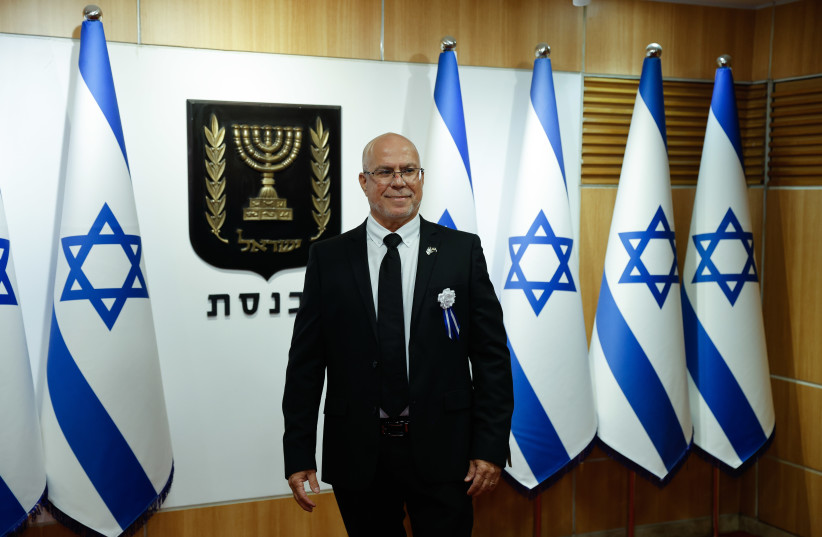Far from the feverish political debate in Israel and all that talk of civil war and sedition, 20 senior officials from various Israeli ministries flew to Abu Dhabi at the beginning of the week for the third follow-up to last year’s Negev Forum that brought the foreign ministers of Israel, the US, Egypt, Bahrain, Morocco, and the United Arab Emirates to Sde Boker.
The Abu Dhabi meeting took place despite regional concern about the new right-wing government in Jerusalem, despite the Jordanians opting – again – not to take part, and despite last week’s visit by National Security Minister Itamar Ben-Gvir to the Temple Mount, a visit that triggered condemnations from all the Arab partners to the Abraham Accords.
Perhaps a positive sign of the permanence of the Abraham Accords that gave birth to the Negev Forum, there were no rustlings of canceling this meeting as a result of the Ben-Gvir visit or because of concern about the direction of the new government in Jerusalem.
US State Department official Derek Chollet, who was one of some 40 US officials who took part in the talks, told reporters on Tuesday that 150 officials representing the different countries of the Negev Forum took part, making it “the largest meeting between Israel and its regional partners since the Madrid Summit in 1991.”
But all of that paled in comparison – at least judging by the attention the meeting received in the Israeli media – to Otzma Yehudit MK Zvika Fogel responding to opposition calls for mass protests and civil disobedience to combat the government’s judicial reform proposals by saying opposition leaders, including Yesh Atid leader Yair Lapid and National Unity party head Benny Gantz, as well as former chief of staff Moshe Ya’alon and former deputy chief of staff Yair Golan, should be arrested for treason.

Negev Forum is diplomacy grunt work – it won't make headlines like political mudslinging
The meeting in Abu Dhabi broke up into six workshops that discussed food security and water technology, clean energy, tourism, health, education, coexistence and regional security. The committees talked about matters such as monitoring, surveillance, and treatment of disease-bearing agents in livestock and plants; securing a regular supply of wheat and grains and emergency reserves; and sustainable methods of agriculture in arid and desert climates.
It was diplomatic grunt work, not the stuff of which headlines are made.
At least not in this country.
A regional meeting to continue to put meat on the bones of a newly formed regional framework that is changing the Middle East landscape barely broke into Israel’s over-heated news cycle. So what if it was the largest regional meeting of its kind dealing with multilateral issues in 30 years? The parley received but scant, perfunctory coverage in the television and radio news.
On Wednesday, the day after the confab broke up, it did not even merit a mention – not a single one – in the mass circulation Yediot Aharonot, whose front page headline dealing with the brickbats over judicial reform read, “On a collision course,” and which ran six different reports and op-eds about that issue.
All that typifies what is happening in the country right now: an inability to see other trees, let alone the forest, through the weeds.
The weeds – ugly weeds, soil-sapping weeds, destructive weeds – are all that talk of sedition and locking up political opponents and civil war. Wall-to-wall media coverage – not the kind that the confab in Abu Dhabi received – helps those weeds spread.
Playing to the media, Gantz warned of civil war on Wednesday. A report in the media made it seem that Ben-Gvir was advocating using water cannons against demonstrators against the government in Tel Aviv, when what he said was that demonstrators in Tel Aviv, if they block roads, should be treated as demonstrators in Jerusalem, which includes turning water cannons on them. And it was in a television interview that Fogel made his outrageous statement about locking up the heads of the opposition.
The country’s politicians, through words, are lighting a fire, and the media gives that fire more oxygen by non-stop coverage. Here is how it goes: one MK responds outlandishly to another MK’s outlandish comment, thereby triggering an equally outlandish comment from a third MK. And on and on, ad infinitum.
Meanwhile, far away in Abu Dhabi, Israeli and Arab officials were talking about matters that were unthinkable just a few years ago – regional security cooperation, sharing solutions to water problems, tolerance and tourism – and it barely made a splash. The media gave it no oxygen.
This is understandable: what do people want to hear more about, disease-bearing agents in livestock or a call, as far-fetched as it is, to arrest leaders of the opposition? Nevertheless, it is also sad and reflective of the country’s current unhappy state of affairs: building up one conflict is so much sexier than gradually trying to resolve another.
